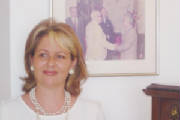
As the World Summit on the Information Society [1] (WSIS) prepares to hold its second summit [2] in Tunis this coming November, some Tunisian bloggers are doing what they can to call attention to the lack of freedom of speech in Tunisia [3]. Global Voices received the following email from Tunisian political activist Neila Charchour Hachicha [4]:
I am still trying to create the PLM which is the Mediterranean Liberal Party to help promote democracy in my country. My unique tools are the PLM’s website [5] and a personal blog [6] both censored in Tunisia.
Over here we live under a very invisible dictatorship, first because our economy is based for a big part on tourism and the regime needs to promote the best image possible of the country, and second because since independence the regime became expert on repressing its own citizens and cheating the International community.
So if you visit Tunisia, or even for any ordinary Tunisian citizen, you will see a very nice country where it is nice to live and where economical progress is visible. It needs to get involved in politics to discover what is really going on behind the scenes and which most of people are not even aware of.
After several amendments our constitution became a tailored constitution at the exclusive service of the ruling party and it’s President who is at the same time the President of the Republic with all powers a presidential regime can offer him. They depend on each other and of course serve each other through corruption.
We have all kind of restrictive and abusive laws that just can’t allow any democratic process to grow fairly and freely. More over laws are not respected by the regime itself. Repression is the regime’s favourite tool for any dissident independent voice either it is radical, moderate or even part of the legal and recognized opposition that the regime built itself to show the International community that it is doing it best to promote democracy.
In fact we have no freedom of association and any association or political party is submitted to the regime’s authorization. This authorization is not a simple right you can freely practice; it is a favour from the regime that gives it only to its supporters. A gathering of more then three persons needs the regime’s authorization.
Of course information is totally controlled by the regime and freedom of speech is inexistent and severely punished when it happens to be. Any punishment does not only concern the activist himself but it can also concern members of his family. The punishments are never directly linked to the act itself but to any illegal situation they can find. These illegal situations are of course very easy to find since laws are often abusive in this intention.
Actually our unique windows of liberty are foreign Medias when they give us access, or Internet, although all political and Tunisian human rights website are censored in Tunisia. So we can be read from abroad or through proxies.
All these facts explain why the Tunisian people are very uncomfortable with any political activity and silence is the main rule. This political silence is used both by the regime and by the activists but in both cases silence is not the right solution. We ought to express ourselves and encourage people to do the same in order to establish a public debate and help every one build his own opinions and convictions instead of being their mind masters.
I am sorry that all my websites are in French, but technology will help you translate and I would like you to visit in particular this page “Tunisian Citizen Wake Up [7]” where you can know more about the Tunisian political reality.
Also a group of Tunisian political activists living abroad created very recently an Association for the defence of the Tunisian Internet activists and the defence of the Tunisian Cyberspace Freedom [8].
We are worried that the WSIS, which will be held in Tunisia, will bring even more censorship and restrictions to freedom of speech.
Neila will be providing English-language updates to Global Voices about the Tunisian blogosphere and freedom of speech issues.